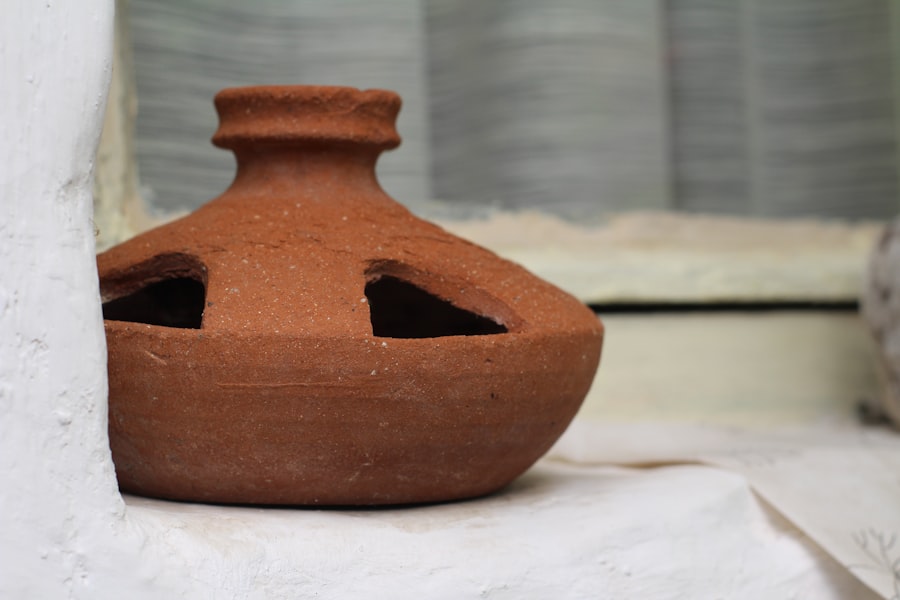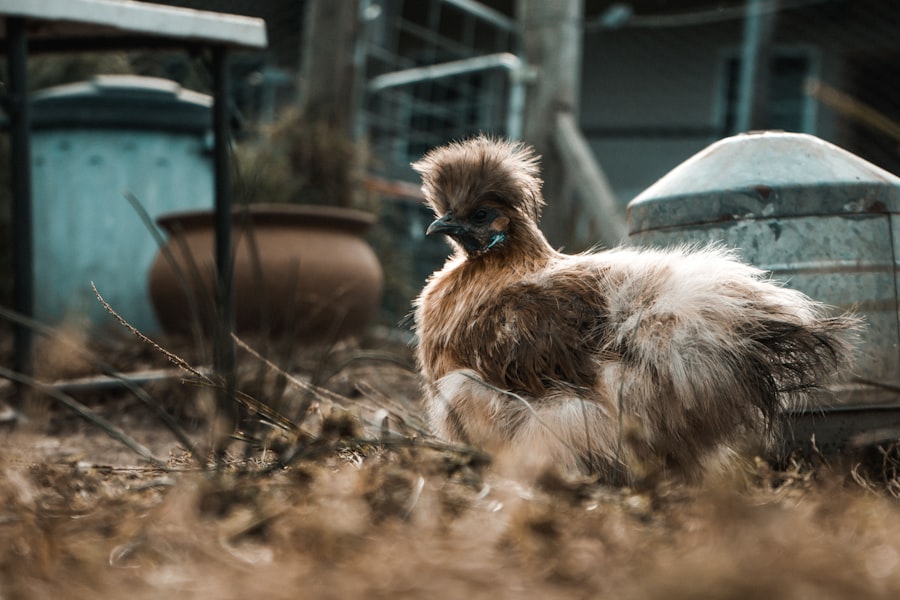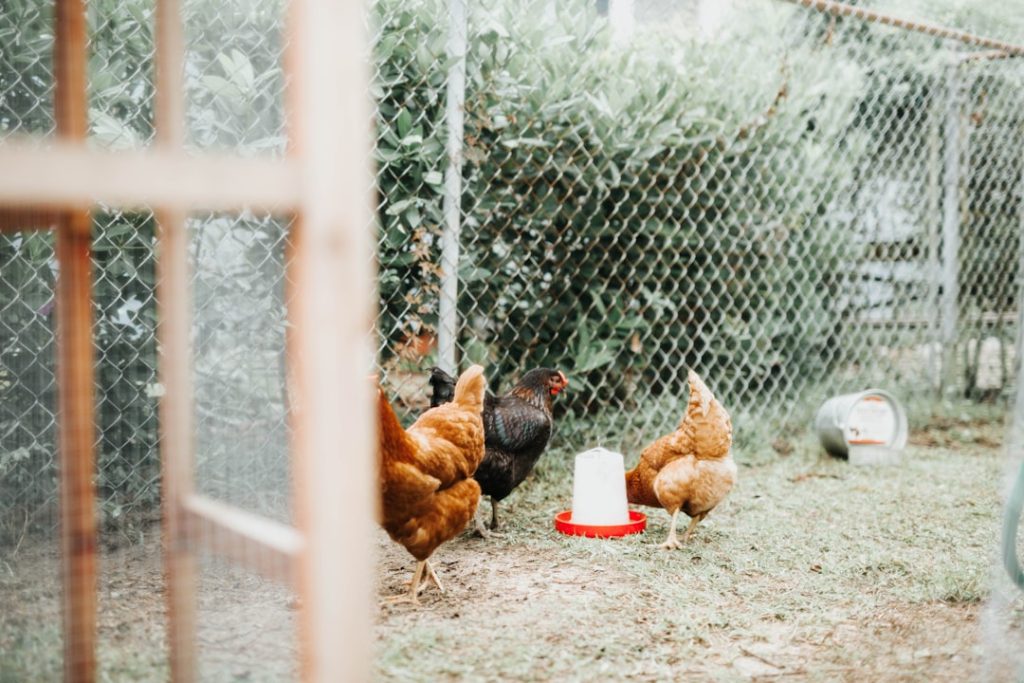Chickens are social creatures with a hierarchical structure known as a pecking order within their flock. This hierarchy determines dominance and submission among individuals. Understanding this behavior is crucial for effective feeding management, as dominant chickens may attempt to control access to food sources, potentially leaving subordinate birds undernourished.
Careful observation of flock dynamics is essential to ensure equitable food distribution. Chickens exhibit natural curiosity and tend to peck at various objects in their environment. This behavior can lead to feed spillage and waste if not properly managed.
Selecting appropriate feeders and implementing suitable feeding techniques can help mitigate these issues while satisfying the chickens’ innate behaviors. Foraging and scratching are instinctive behaviors in chickens, which can result in feed being scattered around the feeding area. This natural tendency can contribute to waste and messiness.
By understanding these behavioral patterns, poultry keepers can choose feeders and develop feeding strategies that accommodate the chickens’ natural instincts while minimizing waste and maintaining a clean feeding environment. Ultimately, a thorough understanding of chicken behavior enables the creation of an efficient feeding system that meets the needs of all flock members.
Table of Contents
- 1 Choosing the Right Feeder for Your Chickens
- 2 Proper Feeding Techniques to Minimize Spills
- 3 Implementing a Regular Feeding Schedule
- 4 Keeping the Feeding Area Clean and Tidy
- 5 Using Feeders with Anti-Spill Features
- 6 Training Chickens to Eat in a Controlled Manner
- 7 FAQs
- 7.1 What are some common methods for keeping chickens from spilling their food?
- 7.2 Why is it important to prevent chickens from spilling their food?
- 7.3 What are some benefits of using anti-spill feeders for chickens?
- 7.4 Are there any DIY solutions for preventing chickens from spilling their food?
- 7.5 How can the placement of feeders help prevent chickens from spilling their food?
Key Takeaways
- Chickens have natural feeding behaviors that can be understood and accommodated for optimal feeding.
- Choosing the right feeder for your chickens is essential for efficient and effective feeding.
- Proper feeding techniques can minimize spills and reduce waste of feed.
- Implementing a regular feeding schedule helps to maintain the health and productivity of chickens.
- Keeping the feeding area clean and tidy is important for the overall well-being of the chickens.
Choosing the Right Feeder for Your Chickens
Size Matters
When selecting a feeder for your chickens, the first consideration is the size of your flock. A larger feeder is necessary for a big flock, as it needs to accommodate multiple chickens at once. On the other hand, a smaller feeder is more suitable for a smaller flock.
Feeder Type and Features
The type of feeder that best suits your flock’s needs is another crucial factor to consider. For instance, if your chickens are prone to spilling their feed, a feeder with anti-spill features is a good option. Alternatively, if your chickens tend to waste feed by scratching it out of the feeder, a feeder with a cover or guard can help prevent this behavior.
Material and Durability
The material used to make the feeder is also an important consideration. Feeders come in various materials, including plastic, metal, and wood, each with its own advantages and disadvantages. It’s essential to choose a feeder that is durable and easy to clean to minimize maintenance and ensure your flock’s access to food. By selecting the right feeder, you can reduce spills and waste, ensuring your chickens have a steady food supply.
Proper Feeding Techniques to Minimize Spills

Proper feeding techniques are essential for minimizing spills and waste when feeding your chickens. One effective technique is to scatter the feed on the ground in a designated feeding area. This mimics the natural behavior of chickens, allowing them to scratch and forage for their food while minimizing spills in the feeder.
Another technique is to use a feeder with anti-spill features, such as a cover or guard. These features can help prevent chickens from scratching or pecking out their feed, reducing spills and waste. Additionally, using a feeder with a lip or rim around the edge can help contain the feed and prevent it from being scattered around the feeding area.
It’s also important to monitor your flock during feeding time and make adjustments as needed. For example, if you notice that your chickens are spilling a lot of feed, you may need to adjust the height or placement of the feeder to minimize spills. By implementing proper feeding techniques, you can help minimize spills and waste while ensuring that your flock is well-fed.
Implementing a Regular Feeding Schedule
Implementing a regular feeding schedule is important for maintaining the health and well-being of your chickens. Chickens thrive on routine, so it’s important to feed them at the same time each day. This helps regulate their metabolism and ensures that they have access to food when they need it.
In addition to a regular feeding schedule, it’s important to provide your chickens with access to fresh water at all times. Water is essential for digestion and overall health, so it’s important to ensure that your chickens have access to clean water throughout the day. It’s also important to monitor your flock’s feeding behavior and adjust their feeding schedule as needed.
For example, if you notice that your chickens are consistently hungry before their scheduled feeding time, you may need to increase the amount of feed you provide or adjust their feeding schedule accordingly. By implementing a regular feeding schedule and monitoring your flock’s behavior, you can ensure that your chickens are well-fed and healthy.
Keeping the Feeding Area Clean and Tidy
Keeping the feeding area clean and tidy is essential for minimizing spills and waste when feeding your chickens. A clean feeding area not only helps prevent the spread of disease and pests but also encourages your flock to eat in a controlled manner. One way to keep the feeding area clean is by regularly removing any spilled feed from the ground.
This can help prevent mold and bacteria from forming, which can be harmful to your flock’s health. Additionally, keeping the feeding area clean can help prevent pests such as rodents and insects from being attracted to spilled feed. It’s also important to regularly clean and sanitize your feeders to prevent the buildup of mold, bacteria, and other contaminants.
This can help ensure that your flock’s feed remains fresh and safe for consumption. By keeping the feeding area clean and tidy, you can help minimize spills and waste while promoting a healthy feeding environment for your chickens.
Using Feeders with Anti-Spill Features

Types of Anti-Spill Feeders
There are several types of feeders available with anti-spill features, such as feeders with covers or guards that prevent chickens from scratching or pecking out their feed. Another type of feeder with anti-spill features is one with a lip or rim around the edge that helps contain the feed and prevent it from being scattered around the feeding area.
Benefits of Anti-Spill Feeders
These features can help ensure that your flock has access to food without wasting it or making a mess. Additionally, some feeders are designed with adjustable height settings or mechanisms that release small amounts of feed at a time, helping to minimize spills and waste.
Creating a Controlled Feeding Environment
By using feeders with anti-spill features, you can help create a controlled feeding environment that minimizes spills and waste while ensuring that your flock is well-fed.
Training Chickens to Eat in a Controlled Manner
Training your chickens to eat in a controlled manner can help minimize spills and waste during feeding time. One effective way to do this is by using positive reinforcement techniques, such as rewarding your chickens when they eat from the feeder without spilling or wasting their feed. You can also train your chickens by gradually introducing them to new feeders or feeding techniques and rewarding them when they adapt to these changes.
For example, if you switch to a feeder with anti-spill features, you can reward your chickens when they successfully eat from the new feeder without making a mess. It’s also important to be patient and consistent when training your chickens. Chickens are intelligent animals that can learn new behaviors with time and repetition.
By training your chickens to eat in a controlled manner, you can help minimize spills and waste while ensuring that your flock is well-fed in a healthy and controlled environment.
If you’re looking for more tips on keeping poultry, you might be interested in this article on what to feed ducks. It offers valuable information on how to properly feed and care for your ducks to ensure their health and well-being.
FAQs
What are some common methods for keeping chickens from spilling their food?
Some common methods for keeping chickens from spilling their food include using specially designed feeders with anti-spill features, placing feeders at an appropriate height, and using feeders with covers or lids.
Why is it important to prevent chickens from spilling their food?
Preventing chickens from spilling their food is important because spilled food can attract pests and rodents, lead to food wastage, and create unsanitary conditions in the chicken coop.
What are some benefits of using anti-spill feeders for chickens?
Using anti-spill feeders for chickens can help reduce food wastage, minimize the attraction of pests and rodents, and create a cleaner and more sanitary environment for the chickens.
Are there any DIY solutions for preventing chickens from spilling their food?
Yes, there are DIY solutions for preventing chickens from spilling their food, such as creating homemade feeders with built-in anti-spill features or modifying existing feeders to make them more spill-proof.
How can the placement of feeders help prevent chickens from spilling their food?
Placing feeders at an appropriate height can help prevent chickens from spilling their food by making it more difficult for them to scatter or waste the feed. Additionally, placing feeders in a stable and secure location can also help minimize spillage.
Meet Walter, the feathered-friend fanatic of Florida! Nestled in the sunshine state, Walter struts through life with his feathered companions, clucking his way to happiness. With a coop that’s fancier than a five-star hotel, he’s the Don Juan of the chicken world. When he’s not teaching his hens to do the cha-cha, you’ll find him in a heated debate with his prized rooster, Sir Clucks-a-Lot. Walter’s poultry passion is no yolk; he’s the sunny-side-up guy you never knew you needed in your flock of friends!







